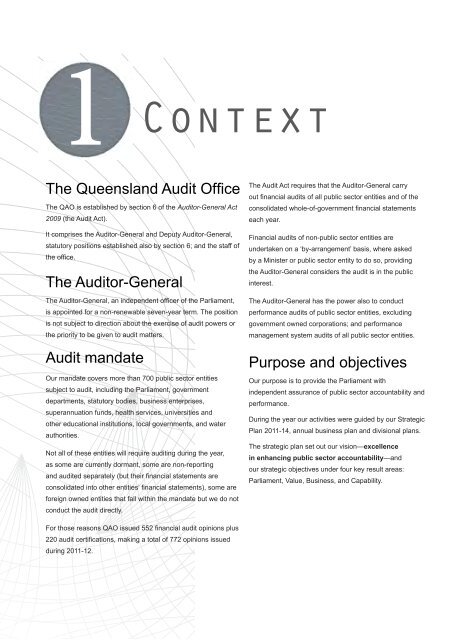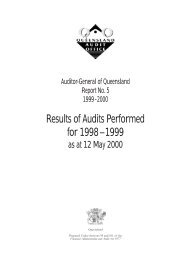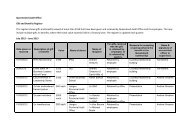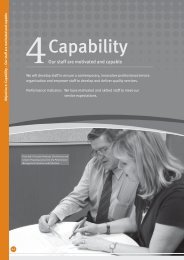Chapter 1 - Context - Queensland Audit Office
Chapter 1 - Context - Queensland Audit Office
Chapter 1 - Context - Queensland Audit Office
Create successful ePaper yourself
Turn your PDF publications into a flip-book with our unique Google optimized e-Paper software.
1 <strong>Context</strong><br />
The <strong>Queensland</strong> <strong>Audit</strong> <strong>Office</strong><br />
The QAO is established by section 6 of the <strong>Audit</strong>or-General Act<br />
2009 (the <strong>Audit</strong> Act).<br />
It comprises the <strong>Audit</strong>or-General and Deputy <strong>Audit</strong>or-General,<br />
statutory positions established also by section 6; and the staff of<br />
the office.<br />
The <strong>Audit</strong>or-General<br />
The <strong>Audit</strong>or-General, an independent officer of the Parliament,<br />
is appointed for a non-renewable seven-year term. The position<br />
is not subject to direction about the exercise of audit powers or<br />
the priority to be given to audit matters.<br />
<strong>Audit</strong> mandate<br />
Our mandate covers more than 700 public sector entities<br />
subject to audit, including the Parliament, government<br />
departments, statutory bodies, business enterprises,<br />
superannuation funds, health services, universities and<br />
other educational institutions, local governments, and water<br />
authorities.<br />
Not all of these entities will require auditing during the year,<br />
as some are currently dormant, some are non-reporting<br />
and audited separately (but their financial statements are<br />
consolidated into other entities’ financial statements), some are<br />
foreign owned entities that fall within the mandate but we do not<br />
conduct the audit directly.<br />
The <strong>Audit</strong> Act requires that the <strong>Audit</strong>or-General carry<br />
out financial audits of all public sector entities and of the<br />
consolidated whole-of-government financial statements<br />
each year.<br />
Financial audits of non-public sector entities are<br />
undertaken on a ‘by-arrangement’ basis, where asked<br />
by a Minister or public sector entity to do so, providing<br />
the <strong>Audit</strong>or-General considers the audit is in the public<br />
interest.<br />
The <strong>Audit</strong>or-General has the power also to conduct<br />
performance audits of public sector entities, excluding<br />
government owned corporations; and performance<br />
management system audits of all public sector entities.<br />
Purpose and objectives<br />
Our purpose is to provide the Parliament with<br />
independent assurance of public sector accountability and<br />
performance.<br />
During the year our activities were guided by our Strategic<br />
Plan 2011-14, annual business plan and divisional plans.<br />
The strategic plan set out our vision—excellence<br />
in enhancing public sector accountability—and<br />
our strategic objectives under four key result areas:<br />
Parliament, Value, Business, and Capability.<br />
For those reasons QAO issued 552 financial audit opinions plus<br />
220 audit certifications, making a total of 772 opinions issued<br />
during 2011-12.
CONTEXT<br />
Parliament<br />
We will provide independent assurance on the stewardship of<br />
public moneys and assets, through our reports to Parliament<br />
with audit recommendations, emerging issues and other matters<br />
of significance.<br />
Value<br />
We will deliver high-quality audit services and develop strong<br />
professional relationships to benefit public sector entities.<br />
Business<br />
We will build quality systems and processes to manage and<br />
report on our business and financial sustainability and audit<br />
performance.<br />
Capability<br />
We will develop staff to ensure a contemporary, innovative<br />
professional service organisation and empower staff to develop<br />
and deliver quality services.<br />
15<br />
<strong>Queensland</strong> <strong>Audit</strong> <strong>Office</strong> | Annual Report 2011-12<br />
15
CONTEXT SECTION<br />
Objective etc<br />
Organisation structure<br />
The organisational structure of QAO supports the <strong>Audit</strong>or-General in meeting the statutory audit functions set out in<br />
the <strong>Audit</strong> Act. The Deputy <strong>Audit</strong>or-General and staff of the QAO are employed under the Public Service Act 2008.<br />
Our organisation is divided into two main sections; <strong>Audit</strong> Operations and <strong>Audit</strong> Support. Figure 1A sets out the<br />
organisation structure that applied during the year.<br />
Figure1A<br />
QAO organisation structure<br />
<strong>Audit</strong> operations<br />
Reporting to the Deputy <strong>Audit</strong>or-General, the Financial and<br />
Performance <strong>Audit</strong> divisions deliver our independent public<br />
sector auditing and reporting services.<br />
The <strong>Audit</strong> Policy and Quality section maintains audit<br />
standards and methodologies, and monitors their use by the<br />
audit divisions.<br />
<strong>Audit</strong> support<br />
Reporting to the General Manager, the Information Services,<br />
Finance and <strong>Office</strong> Services, and People and Performance<br />
sections provide the corporate services necessary for a<br />
fee-charging professional services entity within the public<br />
sector.<br />
16<br />
<strong>Queensland</strong> <strong>Audit</strong> <strong>Office</strong> | Annual Report 2011-12<br />
16
SECTION CONTEXT<br />
Objective Objective etc etc<br />
Executive management team<br />
Significant changes to the executive team during the year<br />
were:<br />
• Glenn Poole was <strong>Audit</strong>or-General until his term expired<br />
on 16 December 2011, and was replaced by Andrew<br />
Greaves.<br />
• Assistant <strong>Audit</strong>or-General, <strong>Audit</strong> Policy and Quality,<br />
Neil Jackson started leave on 30 November 2011 and<br />
resigned on 20 July 2012. Michael Booth acted in his role<br />
from November 2011.<br />
• Assistant <strong>Audit</strong>or-General, Education and Local<br />
Government, John Harten departed on 15 August 2011<br />
and Karen Johnson replaced him in January 2012.<br />
Andrew Greaves – <strong>Audit</strong>or-General<br />
BEc FCA FCPA<br />
Andrew is the twenty-second <strong>Audit</strong>or General of <strong>Queensland</strong>.<br />
He has more than 29 years’ experience in public sector<br />
external and internal audit, at the Commonwealth, state and<br />
local government levels.<br />
Val Manera – Deputy <strong>Audit</strong>or-General<br />
B Com (Acc) FCPA MAICD<br />
Val was appointed in 1993. He has more than 40 years’<br />
experience in auditing at the Commonwealth and state level.<br />
He is responsible for managing the public sector auditing<br />
function.<br />
David Mills – General Manager, <strong>Audit</strong><br />
Support BA MPA<br />
David has worked in several executive positions within<br />
the <strong>Queensland</strong> Government. David provides corporate<br />
management services and guides QAO’s business<br />
improvements.<br />
David is also Chair of the <strong>Queensland</strong> University of<br />
Technology Management School Advisory Board.<br />
Michael Booth – Acting Assistant<br />
<strong>Audit</strong>or-General, <strong>Audit</strong> Policy and Quality<br />
B Bus (Acc) Grad Cert Mgt FCPA<br />
Terry Campbell – Assistant <strong>Audit</strong>or-<br />
General, Performance <strong>Audit</strong><br />
MA PSect Lead Grad Cert PSect Lead<br />
Terry has extensive experience in governance, risk<br />
management and systems, and private and public sector<br />
performance auditing. She is responsible for delivering the<br />
performance audit program and developing the three-year<br />
strategic audit plan.<br />
Paul Shipperley – Assistant <strong>Audit</strong>or-<br />
General, Transport and Development<br />
B Com G Cert Mgt FCPA<br />
Paul has more than 35 years’ experience in public sector<br />
auditing and was appointed Assistant <strong>Audit</strong>or-General in 1998.<br />
His audit responsibilities include <strong>Queensland</strong> Treasury and<br />
Trade, including the whole-of-government financial statements<br />
and <strong>Queensland</strong> Rail Limited.<br />
Poopalasingam Brahman – Assistant<br />
<strong>Audit</strong>or-General, Services and Contracting<br />
B Bus CPA<br />
Brahman was appointed to the position of Assistant<br />
<strong>Audit</strong>or-General in 2001 and has more than 20 years’<br />
experience in performing and managing audits in the public<br />
sector.<br />
His audit responsibilities include <strong>Queensland</strong> Health and<br />
Department of Housing and Public Works. Brahman also<br />
manages our contracted audits.<br />
Karen Johnson – Assistant<br />
<strong>Audit</strong>or-General, Education and Local<br />
Government<br />
B Com FCA MAICD<br />
Karen joined QAO in January 2012, bringing more than 20<br />
years’ experience in senior audit and governance roles in the<br />
private sector. Karen’s audit responsibilities include the audits of<br />
<strong>Queensland</strong> Investment Corporation and Brisbane City Council.<br />
Michael has been with the QAO for more than 28 years.<br />
He leads the audit policy and quality group and is also<br />
responsible for oversight of our internal audit function.<br />
17<br />
<strong>Queensland</strong> <strong>Audit</strong> <strong>Office</strong> | Annual Report 2011-12<br />
17
SECTION CONTEXT<br />
Objective Objective etc etc<br />
Control framework<br />
Our internal control framework helps us meet our organisational<br />
objectives. The key elements are governance, risk management<br />
and self-assessment through various committees. Internal<br />
and external audit are also important elements of the control<br />
framework.<br />
Figure 1B<br />
<strong>Audit</strong> and Risk Management Committee<br />
membership<br />
Governance<br />
The governance bodies which monitor and oversight risk<br />
management and control at QAO encompass the:<br />
• Executive Management Group<br />
• <strong>Audit</strong> and Risk Management Committee<br />
• Information Steering Committee.<br />
Executive Management Group<br />
The Executive Management Group comprises the <strong>Audit</strong>or-<br />
General, Deputy <strong>Audit</strong>or-General, General Manager <strong>Audit</strong><br />
Support and the Assistant <strong>Audit</strong>ors-General.<br />
Before May 2012 the Director, Information Systems <strong>Audit</strong>, and<br />
the Manager, People and Performance were also members.<br />
The purpose of the EMG is to lead the QAO in meeting the<br />
objectives and strategies in our strategic plan, and to assist the<br />
<strong>Audit</strong>or-General in meeting his statutory responsibilities.<br />
<strong>Audit</strong> and Risk Management Committee<br />
The <strong>Audit</strong> and Risk Management Committee (ARMC) advises<br />
the <strong>Audit</strong>or-General, to help him meet his obligations as<br />
Accountable <strong>Office</strong>r.<br />
A membership review of the ARMC during 2011-12, resulted in<br />
the number of members decreasing from seven to three; with<br />
the remaining three being external independent representatives:<br />
Mr Col Colquhoun (Chair), Dr Lyndal Drennan and Ms Christine<br />
Flynn.<br />
Dr Drennan resigned from the committee on 24 May 2012 and a<br />
new external member, Mr Bob Grice has since been appointed.<br />
The external members of the committee are remunerated<br />
for their services. For 2011-12 the Chair received $5 294; Dr<br />
Drennan $3 000 and Ms Flynn, $2 903.<br />
The former QAO representatives Ms Rajagopal, Messrs<br />
Brahman, Hodson and Welsh ceased their membership during<br />
the year.<br />
The ARMC met four times during the year and reviewed various<br />
matters, including business risks, internal and external audit<br />
reports, risk management frameworks, and the QAO draft<br />
Strategic Plan 2012-16.<br />
The ARMC has observed the terms of its charter and had due<br />
regard to <strong>Queensland</strong> Treasury’s <strong>Audit</strong> Committee Guidelines.<br />
Information Steering Committee<br />
The General Manager, <strong>Audit</strong> Support (Chair); the Deputy<br />
<strong>Audit</strong>or-General; the Assistant <strong>Audit</strong>or-General, <strong>Audit</strong> Policy and<br />
Quality; an <strong>Audit</strong> Director and the Director, Information Systems<br />
<strong>Audit</strong> are the members of the Information Steering Committee<br />
(ISC). The Chief Information <strong>Office</strong>r attends most meetings, by<br />
invitation.<br />
The ISC met on 17 occasions during 2011-12, reflecting<br />
the dynamic needs of the business and the reform of the<br />
information function.<br />
The ISC developed the QAO IS Strategic Plan 2012-16,<br />
which the EMG approved. The ISC also established ongoing<br />
processes to measure whether plan objectives are being met.<br />
At the operational level, the ISC developed and reviewed QAO’s<br />
information policies. This review was to ensure that QAO is<br />
making full use of communications technology to support an<br />
increasingly mobile audit workforce.<br />
The ISC has also worked with the Chief Information <strong>Office</strong>r<br />
in reforming the QAO information technology and information<br />
management capabilities. These reforms focused on choosing<br />
skilled staff to fulfil the plan based on the 2010 review by an<br />
external consultancy of QAO’s information, communication and<br />
technology capabilities.<br />
18<br />
<strong>Queensland</strong> <strong>Audit</strong> <strong>Office</strong> | Annual Report 2011-12<br />
18
SECTION CONTEXT<br />
Objective Objective etc etc<br />
Risk management<br />
Our risk framework is maintained in accordance with the<br />
Financial Accountability Act 2009.<br />
The International Standard AS/NZS ISO 31000:2009 Risk<br />
Management – Principles and guidelines has been used to<br />
develop our risk framework.<br />
We have two interconnected risk registers, strategic and<br />
operational, which are reviewed and updated annually. We use<br />
these to assist in identifying risks, and to actively guide effective<br />
methods of responding to and managing risks.<br />
Monitoring of risks is achieved through regular reporting to the<br />
EMG, and to the <strong>Audit</strong> and Risk Management Committee.<br />
This year we rationalised our risk registers to better integrate<br />
and align them with our strategic and business plans.<br />
The latest review showed that the framework was operating<br />
effectively, and focused on integrating and aligning the registers<br />
with our strategic and business plans.<br />
Internal control<br />
QAO’s internal controls, described in documented policy<br />
and procedures, are evaluated for effectiveness through<br />
management self-assessment, internal audit and external audit.<br />
Self-assessment<br />
QAO audit and administrative policies and procedures are<br />
readily available to all staff on our intranet. QAO’s business<br />
units continually monitor and update policies and procedures<br />
based on changes in legislation, directives, standards and<br />
guidelines. All new employees to QAO are briefed on our key<br />
administrative policies as part of their orientation.<br />
During the year, five QAO policies were rescinded and 15<br />
revised. One new policy was developed on social media.<br />
Internal audit<br />
Internal audit operates under its own charter and reports directly<br />
to the <strong>Audit</strong>or-General. The charter aligns with the International<br />
Standards for the Professional Practice of Internal <strong>Audit</strong>ing<br />
developed by the Institute of Internal <strong>Audit</strong>ors.<br />
QAO’s Head of Internal <strong>Audit</strong>, Michael Booth, B Bus (Acc) Grad<br />
Cert Mgt FCPA, managed the internal audit program during<br />
most of 2011-12. The program was delivered through a<br />
co-sourcing contractual arrangement with Hayes Knight (Qld)<br />
Pty Ltd.<br />
In line with its charter, the <strong>Audit</strong> and Risk Management<br />
Committee oversaw the internal audit program, including the<br />
review of report findings and management responses.<br />
The major areas audited related to corporate reporting,<br />
business continuity, wireless cards, leave management, and<br />
portable and attractive assets. There were no high risk issues<br />
reported. All issues have either been implemented or are in the<br />
process of being addressed.<br />
External audit<br />
Mr Simon Hancox, Director, <strong>Audit</strong> and Assurance, with Grant<br />
Thornton, was appointed by the Governor in Council as the<br />
independent external auditor of QAO. The appointment was for<br />
three years and commenced in the 2010-11 reporting period.<br />
All items raised by the external auditor during 2011-12 have<br />
been resolved and recommendations fully implemented.<br />
At the <strong>Audit</strong> Risk Management Committee meeting of 25 July<br />
2012, the external auditor presented his year-end report, in<br />
which several low risk areas for improvement were identified.<br />
QAO is currently taking action to address these matters.<br />
The audited financial statements are on pages 52 to 86 of this<br />
report.<br />
This year we directly engaged and paid our external auditor<br />
to undertake a review engagement of the non-financial<br />
performance information included in this report, which is taken<br />
from our Service Delivery Statement. This provides added<br />
assurance to the users of our annual report that this information<br />
is reliable and fairly presented.<br />
The audited performance statement is on pages 90 to 94 of this<br />
report.<br />
Our external auditor provided no other services to the QAO<br />
during the year.<br />
The primary role of internal audit is to conduct independent and<br />
objective assurance activities. The scope of the work is set out<br />
in the approved strategic internal audit plan and the internal<br />
audit plan.<br />
<strong>Queensland</strong> <strong>Audit</strong> <strong>Office</strong> | Annual Report 2011-12<br />
19







